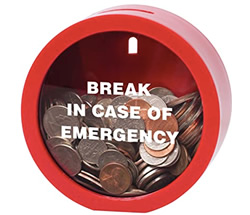Maurie Backman* says if you have to deplete your emergency fund due to the COVID-19 pandemic, here’s how to rebuild it afterward.
 Not only is the COVID-19 outbreak making people sick; it’s causing millions to lose their income.
Not only is the COVID-19 outbreak making people sick; it’s causing millions to lose their income.
With small businesses closing, retailers cutting back their hours or shutting completely, and countless parents going without child care as schools move to online learning, a large number of workers are dealing with slashed hours or even pay cheques that have completely disappeared for the foreseeable future.
If you’re in either boat and have money in a savings account, now’s the time to dip in.
In fact, if you have a true emergency fund — one with enough money to cover a good three to six months of living expenses — you may not be panicking to the same extent as those without an income who don’t have savings at all.
Still, the idea of depleting your emergency savings can be both frightening and disheartening.
But try not to get too down — once things stabilise and businesses are able to open again, you’ll have an opportunity to replenish your cash reserves.
Here are some things you can do both now and once the crisis is over to build your account balance back up as quickly as possible.
- Cut as many expenses as you can right now
You can’t cut back on food or medications when you lose your paycheque— you need those things to survive.
What you can do, however, is immediately stop spending money on non-essentials so you’re not withdrawing needlessly from your savings.
As much as you may want to support local restaurants, now’s not the time to be ordering takeaway three nights a week; you should stick to cheap pantry staples to limit your savings account withdrawals.
Once the crisis wraps up, be prepared to keep doing the same thing — cutting back on non-essential spending so you’re able to resupply the money you had to remove.
Of course, it won’t be easy to say no to restaurant meals, concerts, and vacations after spending weeks or longer holed up at home.
But if you’re serious about rebuilding your emergency fund, that’s the best way to do it.
- Get a second job
Hopefully, there will come a point in the not-so-distant future when businesses reopen and you’re able to go back to work.
Once that happens, consider starting a side hustle on top of your main job.
If you’re able to pay your monthly expenses with your earnings from your main job alone, you can use your side gig earnings to replenish your savings.
Meanwhile, it pays to see if there’s gig work available right now that you can do remotely (unfortunately, signing up to drive for a rideshare company or doing anything that involves interacting with people isn’t a particularly safe option right now).
That could involve getting paid to blog, develop websites, or design logos from home.
It also pays to look into online tutoring gigs — with so many children now forced into home-schooling arrangements, you may find lots of parents who are stretched too thin and would be glad to pay for that service.
- Monetise your home
Right now is not the time to go out, find a tenant, and introduce a whole new set of germs into your household.
But if you have a separate, finished space in your home that you’re able to rent out on a short-term basis, such as a granny flat or garage, that rental income will help restore your savings account to its former state.
Of course, you’ll need to check with your local council to make sure taking in a tenant is legal in your area.
But if you go this route, you may find that your emergency fund gets replenished more quickly than expected.
And if making that option feasible means cleaning out the granny flat or garage, well, now’s the time to tackle a time-consuming project like that since you’re stuck at home anyway.
Having emergency savings puts you ahead of the game during a crisis like the one we’re facing with the coronavirus pandemic because you don’t have to make so many difficult financial decisions.
But if you worked hard to sock away that pile of cash, watching it disappear can be very upsetting.
If that’s the case, try your best to stay positive and remember that this crisis, too, shall pass.
And once it does, you’ll have a solid opportunity to rebuild.
* Maurie Backman is a personal finance writer.
This article first appeared at www.fool.com/the-ascent.











